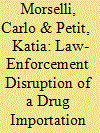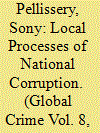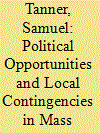| Srl | Item |
| 1 |
ID:
078970


|
|
|
|
|
| Publication |
2007.
|
| Summary/Abstract |
This study focuses on the structure and evolution of a drug importation network that operated from Montreal, Canada, and that was the target of an extensive 2-year criminal investigation. The investigation was atypical in that it followed a seize-but-do-not-arrest strategy - while 11 drug shipments were seized by police throughout this period, arrests were never made until the final phase of the investigation. Such a case offers a rare opportunity to study the dynamics of a criminal network under intense surveillance and disruption. The reconstruction of the importation network is based on electronic communication transcripts that were intercepted and compiled during the investigation. Findings from analyses of the principal changes that took place within the communication network reveal how network centralization and critical node status are variable, and not static, properties of a criminal network under considerable constraint. The study demonstrates how a criminal network decentralizes and is re-ordered in response to intense law-enforcement targeting. Contributions are made to research on disruption in criminal networks. We conclude with a discussion on how a criminal network's flexibility, a feature generally presented as a sign of resilience, may contribute to a more significant demise within a context of intensive control
|
|
|
|
|
|
|
|
|
|
|
|
|
|
|
|
| 2 |
ID:
078971


|
|
|
|
|
| Publication |
2007.
|
| Summary/Abstract |
This paper provides a bottom-up view of national corruption in India and presents a framework of corruption involving three actors: bureaucrat, politician and legitimate claimant. The paper then focuses on the public service provision of social security in an Indian village and the role of elites in perpetuating the corrupt practices to access this public provision. This study is based on an extensive fieldwork and uses network data. First, I show that the political elite bridges the 'structural hole' between the institutions of state and society, have the advantage of information, referrals and are the main beneficiary of local corrupt practices. Second, factional politics is carried out through the use of corruption and it results in exclusion of the poor persons from the welfare rights to which they are entitled. The paper also explores how the local processes of corruption interact with state-level processes and shows how protest against corruption is silenced.
|
|
|
|
|
|
|
|
|
|
|
|
|
|
|
|
| 3 |
ID:
078972


|
|
|
|
|
| Publication |
2007.
|
| Summary/Abstract |
Participation in mass crime is often approached from a top-down perspective that centralizes the actions of the masses under the order of elites and leaders. While there is some evidence to support this approach, a more complete assessment of participation in mass crime must also consider the grassroots contingencies that unite the collective motivation and capacity that induce such actions. Such a bottoms-up approach is developed in this article with a particular focus on the personal experiences of former Serbian militiamen who took part in scenes of mass violence in Croatia and Bosnia-Herzegovina. Interviews with former militiamen illustrate how political opportunities, diverging nationalistic attitudes, proximity to growing violence in increasingly localized killing fields, incentives to participate in parallel criminal activities, and an influence within community networks that were submerged in mass crimes united to legitimize and facilitate their personal commitment to the events that took place in this region during the 1990s
|
|
|
|
|
|
|
|
|
|
|
|
|
|
|
|
| 4 |
ID:
078973


|
|
|
|
|
| Publication |
2007.
|
| Summary/Abstract |
This piece gives an account of the Georgian government's recent attempts to crackdown on the institution of thieves-in-law [vory-v-zakone] within Georgian society. The events surrounding the problematisation of the thieves-in-law are examined and different answers are offered to the underlying question of the article: what threat does this subversive group pose to the government? It is argued that the vory do not represent a potential criminal revolution but are victims of a resurgent state producing a politics of law that seeks to stamp out subverting influences within society. The thieves' world represents an alternative moral order which is attractive in a country which suffers from acute alienated statehood. Thus the fight against the vory should be understood as a battle to win back the hearts of the Georgian people for the state and for the law.
|
|
|
|
|
|
|
|
|
|
|
|
|
|
|
|